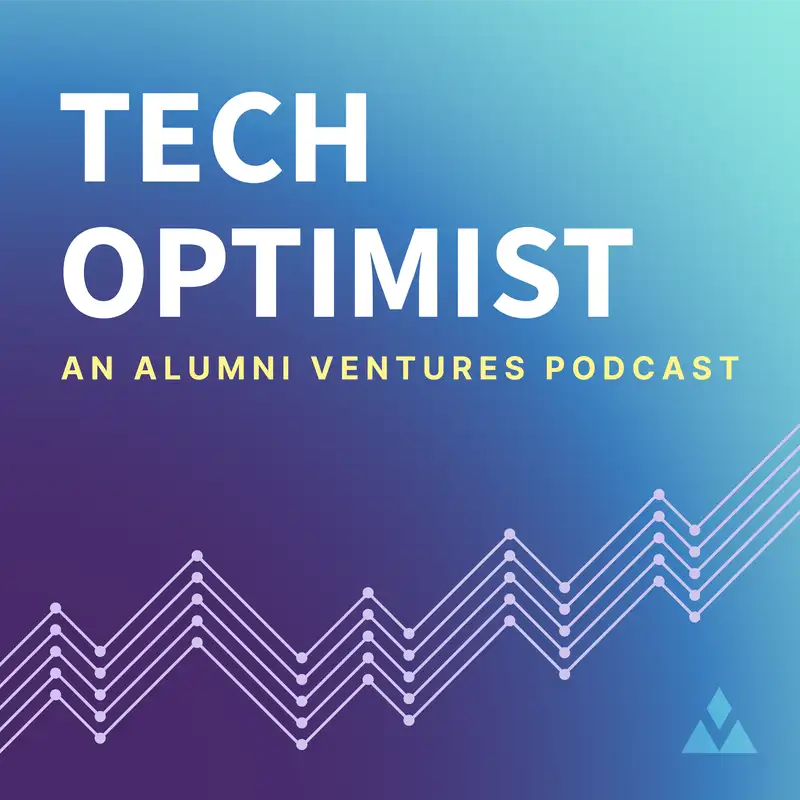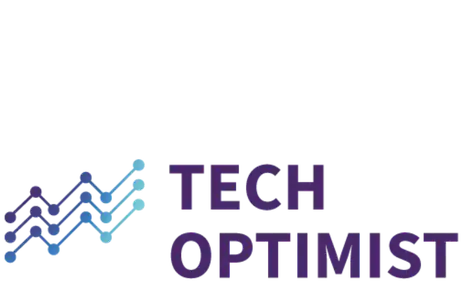#67 - Meet the Startup Unlocking Crypto-Backed Loans
Samantha Herrick:
This is a podcast brought to you by Alumni Ventures, a show where we tell you the stories and creators of tomorrow. Welcome back, everyone, to the Tech Optimist.
Dhruv Patel:
But then if you zoom back, what Arch is really focused on is building a next generation wealth management, private banking platform for people with alternative assets, and really looking to redefine financial services.
Himanshu Sanay:
And the reason for that really is in the last 15 years, people's asset allocations have changed from the stocks, bonds and real estate, into being heavily invested in crypto, and they're at a disadvantage when it comes to accessing traditional financial services at their banks or other platforms they use.
Samantha Herrick:
That is Himanshu Sahay and Dhruv Patel, CTO and CEO of Arch Lending.
Mike Collins:
40 to 60 million Americans now have crypto assets of some kind, right? So this isn't a rare phenomenon anymore.
Samantha Herrick:
And that is the man who needs no introduction, your podcast favorite. That is Mike Collins, co-founder and CEO at Alumni Ventures.
There is a YouTuber that I've come across this past week while I've been editing this episode called Hack Crypto on YouTube, and actually, the first week of October, he released a video on Arch Lending. And that's me. My name is Samantha Herrick. I'm the guide and narrative writer for this show.
Okay, let's take a second to intro our startup for today, Arch Lending. Now, we have two of their C-suite members here today, the CTO and the CEO. We just introduced them, and you'll hear more from them here in a second. But as far as the business itself, I want to kind of dive into that a little bit before we hop into the conversation a bit more. Before we get into the nitty gritty fun stuff, right?
So Arch Lending is a New York based FinTech startup that provides crypto-backed loans. So a little bit more on the company. They were founded in February of 2022, based out of New York City, and they operate under US State Lending license in 32 states in this country. So pretty much what they offer, right? They offer crypto-backed loans using Bitcoin, Ethereum, and Solana as collateral, and loans in Fiat USD and USDC Stable Coins, and they have startup equity-backed loans for employees of select high growth companies.
So some key features that kind of make this company stand out. Their assets are stored in qualified custody through BitGo. $250 million insurance policies on client funds. They have a loan-to-value ratio of up to 90% for crypto-backed loans. Their maximum loan terms are 12 months, and there's fixed interest rates generally lay at about 12%.
So in recent funding, let's get into a bit of the startup details here. In August of this year, Arch Lending raised $75 million in funding, $5 million equity seed round led by Morgan Creek Digital and Castle Island Ventures, and $70 million loan financing facility provided by Galaxy Ventures.
So, their business model. Arch Lending aims to provide a secure and regulated platform for crypto-backed loans, targeting both individual and institutional investors. They emphasize security, compliance and customer service as key differentiators in the crypto lending space.
So I guess, some future plans for the company. They plan to expand its loan financing facility. They plan to potentially introduce self-repaying loans. They plan to launch additional investment products, including a basis trade solution, and they sort of position themselves as a trustworthy alternative to the crypto lending space, focusing on regulatory compliance and security to address concerns arising from recent high profile collapses within the industry.
Before we get into the show, we're going to hop into an ad and a quick disclaimer, and then we'll hop into the greedy stuff. All right, hang tight. We'll be right back.
Matt Caspari:
Hey everyone, just taking a quick break so I can tell you about the Deep Tech Fund from Alumni Ventures. AV is one of the only VC firms focused on making venture capital accessible to individual investors like you. In fact, AV is one of the most active and best performing VCs in the US. We co-invest alongside renowned lead investors.
With our Deep Tech Fund, you'll have the opportunity to invest in innovative solutions to major technical and scientific challenges, which can have a hugely positive effect on society, companies that have the potential to redefine industries and create a more sustainable future and deliver significant financial returns. So if you're interested, visit us at AV.VC/funds/DeepTech. Now, back to the show.
Samantha Herrick:
As a reminder, the Tech Optimist podcast is for the informational purposes only. It is not personalized advice and it's not an offer to buy or sell securities. For additional important details, please see the text description accompanying this episode.
Okay, so we're taking a bit of a different approach to this episode. Normally, I would just hand the mic off to Mike or whoever our AV host is for this episode and kick off the interview. But I am a person who does not delve in the world of Bitcoin, Ethereum or Solana, or just ETFs and crypto in general. I tend to have a sort of hard time understanding what it means, how it works, and how it actually applies to real life stuff.
So if there's anyone that's listening to the show that is a lot like me, that doesn't really know what's going on in this topic typically, and is trying to educate themselves more, there is a YouTuber that I've come across this past week while I've been editing this episode, called Hack Crypto on YouTube. And actually, the first week of October, he released a video on Arch Lending, and how it works and how their platform works. And so, he made a video of a demo of their platform.
In the demo, he goes through the four-step process of what it would look like to take out a loan, and really emphasizes how well-designed and well-cultivated Arch Lending's platform is. And disclaimer from this, he has this on his in the description of the video, but he's not a financial advisor, and this is not investment advice, this is just him being an educator and just sort of entertaining people with crypto content.
So I'm going to play bits of that, because I think it's really cool to hear another content creator talk about the guest that we have on today, and their actual platform and their technology. So I think it would be cool to learn about the technology and then hear from the guys who designed it and built it. So without further ado, let's hop into that video, and then we'll go into the interview.
Hack Crypto:
On this episode, I'm going to be going over a full demo of Arch, the lending platform that allows you to borrow against crypto assets, specifically Bitcoin, Ethereum, and Solana. What I love about Arch is that it is simple to use, very similar to BlockFi, where it has a great design, it's very intuitive, easy to go on, easy to understand. Everything is laid out in simple terms.
And when it comes to financial instruments, it's very important to understand all the different aspects of what you're getting into. And when it comes to 60% loan-to-value ratios, when it comes to partial liquidations, when it comes to margin calls and the different fluctuations that you're going to have in the underlying asset that you're borrowing against, it's very important. When things are volatile like a crypto asset, like Ethereum or Bitcoin, you need to understand what's going into this.
So I like how they've laid it out. I'm going to show you guys the signup all the way to the actual loan itself. And my favorite part of this is the explanation screen, because it's very easily laid out, and the different ways that you can play with the loan numbers on the screen before you move forward.
So there's a lot of interesting parts here. It's very important to know upfront that when you're doing a loan like this, it is for personal use. The individual use is different than the business use, and that is banking rules. That is regulation. There's a lot of things that go into that. So everybody that's looking at this and is going to sign up for this, it's important to know, if you take a loan out and you're an individual, do that with a personal bank account. If you are a business, you would have to go through the institutional selection on their platform that is different. So it is a different process.
So the previous video I did on Arch was because they had just raised $75 million in a mix of equity and, of course, debts to accelerate the lending aspect of this with collateralized loans. But ultimately people have asked me since I put that video out, and I've talked about a lot of these different products over the years, why would you do this? Why would you do a 15%, short-term, 12-month loan on something like Bitcoin or Ethereum?
A couple of different things. What's really important to know is that this is not a taxable event. This is debt. You are borrowing against an asset that you own and you are taking a debt note against that asset. So therefore that's not a taxable event. That is in and of itself an extreme value. If you liquidate an asset, you no longer own it and you have that cash, but you owe tax on that transaction. This is not that type of transaction. This is debt against that asset. You are unlocking liquidity where it was not there previously.
Now, the tax after you are doing a sale of something like one Bitcoin, you're going to be paying 20% or so. It depends on how long you held it, but ultimately in rough numbers, you're going to pay 20%. So if you knock that off, that's an 80% LTV if you were to borrow against that. This is offering 60% loan-to-value. So I think it's important to weigh these up when you're thinking about different options out there, and Arch is very legitimate in the US, super secure.
So another question that I've gotten is like, okay, well, my credit's not good. What do I do? This does not require a credit check by any means. You do have to verify your identity, just because of the Patriot Act and different things in the United States, but you do not have to do a credit check. It's just going to verify your identity, and it does it. Within the same day, you can get your funds. It's up to 12 months, 14, 15% interest rate depending on the LTV.
And what is really key here to understand, when you're borrowing at 14 or 15%, what's crucial is what you're doing with that money has to offset that percentage. And I'll say that in a different way. If you're borrowing against an asset that has a 15% cost of capital on it, you need to make sure that what you are putting that money into is greater than that cost of capital, like an investment in a business that has no cap into what you can return.
So use the tools after you've learned everything there is to know about them. This is not a sponsored review by Arch. I've reached out and said, "Hey guys, I'm going to be making a video," and they were like, "Awesome." And this is not a sponsored transaction by any means. I just wanted to use the platform, and now that I am a user of the platform, I'm stoked for what they're doing. I'm really excited for this. So let's jump on to their website and I'll show you end to end what this looks like.
All right guys, it is demo time. Now, there are four different phases of setting up a new loan on Arch. There's the first, which is configuration. This is where you're going to enter in all of the information that you need to structure your loan. So first we're going to go ahead and put our location in. This is Florida. And there is the payback period. So this can be anywhere under 12 months, basically. The maximum length that they have right now is 12 months. I believe that that could change over time, but ultimately they're starting with 12 months.
Now, principal and interests. There are a lot of benefits, and of course downsides, to having principal interest with a short-term loan, but ultimately, the interest only is usually what people are going to pick because you're going to refinance this, or restructure it, however you want to phrase it. You're going to change the terms of this likely by the end of the 12 months or before the end of the 12 months. So if you want to chip away at the principal and interest, you can do so, but ultimately people are usually going to restructure it anyways. So interest only is usually the way to go.
We're going to go ahead and put in one here, and you can see our terms. 15.5% APR, and that consists of 14% annual interest rate plus 1.5% origination fee annualized. This at the time of recording this, $62,000 Bitcoin is a loan amount of $37,000. And why is that less than the overall amount of Bitcoin, you ask? That is this number right here, loan-to-value.
Now, loan-to-value is a ratio that is calculated, if you go back and check my videos that I've done in the past, with collateralized loan platforms and the crypto space. The LTV ratio is similar to a HELOC or HELO on a rental property or a real estate investment. So the idea here is that you are basically only allowed to take a certain percentage of that collateral out, and it is a balance for risk when it comes to the lender's perspective. But for the borrower's perspective, you just need to know what percentage you can take out.
So they have their different calculations here, of course, and they're different by the asset. Very important to know that. This isn't 60% across the board. That is the max for Bitcoin specifically. And you can see that they have their different percentages, and you can see there is a liquidation that happens when the price moves around. And there are a lot of different terms going into this, but ultimately what you need to know is that the percentage here is the amount that you get towards the entire value.
This is a non-taxable event. If you were to sell half a Bitcoin here and take that money off the table, you would be paying tax on that. In a collateralized loan environment and that type of transaction, it's not taxable. That's debt. So that is a huge value to this, and you are sacrificing that in the LTV percentage, basically. So in order to hold onto the asset itself, you have to have that kind of lower LTV ratio, but you need to determine how you're going to get paid out. Is it going to stay in the crypto ecosystem in a stable coin like USDC, or are you going to take it in dollars? In this case, US dollars, right into your bank account.
And most cases, most of the people that I know that do these types of loans, they're doing it in dollars so they can make a business transaction in US dollars, and they're getting out of the ecosystem. And that is sort of the bridge here that people are trying to accomplish. They're trying to keep their digital assets while moving into cash positions, and not having a tax liability set up here and making it a pretty seamless experience. So definitely in my opinion, a bank wire. Personal loans require a dispersal to personal bank accounts. It would likely be dispersed. If you would like to put it into a business bank account, you will have to borrow using a business entity.
So the thing here is that this is only for personal use, not business use. So you're going to have to do it as an individual. You could do whatever you want with the funds after the fact, like invest in a business once it's taken out into your personal account. But that's a really key aspect here. They are regulated in the US, and making sure that institutions and entities, that our businesses are signed up correctly as businesses, are getting the proper wires sent. So that's really, really important.
Samantha Herrick:
All right, so I hope you enjoyed that little demo that I just shared there, but now we're going to hop into the interview with Mike and the two guys from Arch Lending. So without further ado, Mike, take us away.
Mike Collins:
All right, welcome to the Alumni Ventures Meet the Startup podcast. I'm here with a really exciting company, Arch Lending. I'm here with the two co-founders, Himanshu Sahay and Dhruv Patel. Welcome to the show, guys.
Himanshu Sanay:
Thank you, Mike.
Dhruv Patel:
Thanks for having us, Mike.
Mike Collins:
So tell us, give us the elevator pitch. What's Arch Lending? What do you guys do and why does the world need it?
Dhruv Patel:
Yeah, so the quick elevator pitch for us right now is, we provide over [inaudible 00:16:44] loans against cryptocurrencies. So think Bitcoin, Ethereum and Solana. But then if you zoom back, what Arch is really focused on is building a next-generation wealth management, private banking platform for people with alternative assets, and really looking to redefine financial services.
Himanshu Sanay:
And the reason for that really is, in the last 15 years, people's asset allocations have changed from the stocks, bonds and real estate, into being heavily invested in crypto and equity private company, either as employees or investors in these companies, and they're at a disadvantage when it comes to accessing traditional financial services at their banks or other platforms they use. So there's a massive opportunity selling this customer base, which is only growing. Crypto asset class alone has grown 646-X in the last 10 years, and it's only continuing to grow.
Mike Collins:
Yeah, I mean, I was early into this experience, and everybody thought I was crazy. And it's obviously had ups and downs along the way, but it's been one of the single greatest investments in my life, and I don't think we're at the end of the journey yet. I heard something recently, which is there's something like 40 to 60 million Americans now have crypto assets of some kind, right?
Himanshu Sanay:
Yes.
Mike Collins:
So this isn't a rare phenomenon anymore.
Samantha Herrick:
To wrap up this sort of elevator chapter of this podcast and of this interview, I am going to read something from Arch Lending's website. So I'm on the page ArchLending.com/about, and it's a letter from the founders, from Himanshu and Dhruv themselves, and I want to read it because I think it's super interesting, super fascinating.
The next conversation or the next section of this podcast is where Mike and the guys really talk about just the future space of crypto investing, and just money lending in general. So that's a really exciting narrative. So that's coming up next. But for now, the letter from the founders.
As long-term crypto investors, we faced the persistent challenge of finding trustworthy financial services that truly understood our needs. We realized the ideal solution didn't exist, so we decided to build it ourselves. That's how Arch was born, a platform designed by crypto investors for crypto investors. Our mission is simple, to be the leading crypto financial services platform, renowned for industry defining security, trust and premier product experience and concierge customer service.
Security first. Security is at the heart of everything we do. Arch holds all assets in qualified custody, ensuring your assets are safeguarded with bank grade security and insurance. Whatever your use case, your assets are safe with us.
Trust as our foundation. Arch was founded on the principles of security, customer experience and asset protection. We operate a strict no-rehypothecation policy and follow regulatory licensing and compliance rigidly in all operations, ensuring your trust in us is well-placed.
Seamless experience. Arch is the only fully automated crypto lending platform. You can configure your loan and receive funding within minutes without the hassle of approval processes.
Exceptional customer service. Our team is available across chat, phone, email, and text to support you whenever needed. Thank you for choosing Arch. We're here to provide you with the most secure, trusted, and seamless crypto lending experience. Sincerely, Dhruv and Himanshu.
Mike Collins:
Talk about the bigger trend of where do you see this over the next five or 10 years going, as far as not just your company, but kind of the industry in general. What are the tailwinds?
Dhruv Patel:
Yeah, I think maybe I can separate that out. To your point, there's a growing number of people in the US owning crypto, and we see that across our customer base. It's not just maybe what you would have thought as your younger demographics living on the coasts. We have folks throughout the country, from their 20s to 70s, and really, the common theme is most of them are holding for the long run, and that's why they're coming to us to borrow against these assets so that they can make other investments or purchases, if you will.
And where we see ourselves is really, right now we handle that core need for our customer, which is liquidity against these assets that they have, but we really see ourselves going more full stack and doing more of their financial services. So tomorrow is maybe allowing them to put their idle assets to work and earn yield on them, allowing them to do other financial services through Arch, so that we become the full financial provider for them.
Mike Collins:
Tell me a little bit about where you think the regulatory environment is going to go in this stuff. Obviously, we're in an election year, and there's a red team and there's a blue team. How do you think that that's going to play out?
Himanshu Sanay:
Yeah, I think it's been identified very clearly that the crypto base is quite significant. I think the red team, as you call them, identify about 50 million US wallet holders in crypto, which is quite significant. It's the second-largest donor group behind them as well. So it's being understood as a very important base, and I think that's going to lead to increased regulation, as the US needs and the US is far behind in regulation when it comes to crypto, compared to some of the other Western countries. And I think as this need becomes more and more front of mind, as people in power understand how important this base is and how important this industry is for the US to grow, it's only going to get more regulated, which we welcome and we encourage, because we're doing this in a fully regulated fashion. We think the future of crypto in the US, and in the world, really, is which regulation [inaudible 00:23:16] .
Dhruv Patel:
No, I was going to say I think regardless, it's definitely possible here. The way I think about it is separating the election in crypto at this point. Regardless of how the election goes, crypto is at a point where it's no longer just a small movement. You have financial giants like Black Rock pushing not only the EGS, but other derivatives on top of it. And so, I think it's gotten to a point where certainly it's something that's [inaudible 00:23:43] more, and the regulations will follow.
Mike Collins:
Way I see it is, and again, this has been a space I've been involved with investing in some time, which is I think the floor keeps moving up. Meaning there were times where it's like, oh, this could be made illegal. The floor versus the ceiling, the floor was pretty scary in 2016-17, right? That is long gone, that there are SEC approved ETFs, there is this... There's too many people that own too much wealth for this genie need to go back in the bottle. So I think the floor, every year, just keeps going up on the potential here, and the ceiling kind of stays the same. And I think you have both parties recognizing both the value of the communities. So you have the blue team with a strong California technology influence, and you have the red team looking to appeal to this market. So I think it's kind of, for crypto, heads, you win, tails, you win.
Himanshu Sanay:
I'll give you an example of how important this becoming. So I was at dinner a couple days ago with President Trump and a number of crypto leaders, less than two months before election, and he showed up the afternoon after he'd already done a rally. A candidate four years ago wouldn't have taken the time to speak to crypto this close to an election, but now it's become even more important to appeal to this crowd and to understand their needs, and that's why that didn't happen.
Mike Collins:
Yeah, it's definitely become a desirable donor base. It's definitely become something that I think they have to address, and you can't just kind of shake it off. What's your ask? I mean, we have a large community of other founders, we have a lot of people that have invested in our funds. How can they help you?
Dhruv Patel:
Yeah, I think there's a few different avenues. One is, we always are looking to have conversations with people that are in the crypto industry, whether you're a personal investor, you are a founder of a crypto company that we might be able to work together with more broadly throughout the ecosystem. And then, otherwise, I think we're always looking for feedback of folks that are investing in alternative assets broadly, and pain points that they may have to help inform us of our feature roadmap as we continue to scale.
Samantha Herrick:
We're going to take some time for a quick break, but then we'll be right back.
Speaker 7:
Do you have a venture capital portfolio of cutting edge startups? Without one, you could be missing out on enormous value creation and a more diversified personal portfolio. Alumni Ventures, ranked a top-20 VC firm by CB Insights, is the leading VC firm for individual investors. Believe in investing in innovation? Visit Av.vc/foundation to get started.
Mike Collins:
Great. What's a myth or a misunderstanding that you think people have about this asset class?
Himanshu Sanay:
I think a lot of people, especially from traditional finance, think of crypto as very volatile, when in fact, at least [inaudible 00:27:20] crypto, as we define Bitcoin and Solana, is less volatile than big tech companies in the stock market today. So as a lender, lending against crypto is much safer for us than lending against stocks or some other asset which isn't quite as liquid. Crypto is 24/7, there is realistically no way for us to have a loss on a loan book, which is over-collateralized by crypto, because as the price drops, it's never going to fall under you in between the market opens and closes. It's going to be a continuous drop or increase, and we can always liquidate if we need to along the way.
Mike Collins:
Yeah, no, I think that's a really good point. I also think, one thing I think that is also a tailwind to this alternative asset class and decentralized systems is, clearly we have one thing both political parties have agreed to is incredible spending, and incredible deficits, and incredible printing of money. And so, I think smart people, including institutions, are understanding that part of a diversified portfolio is not just stocks and bonds, but it's got to be alternatives, and then within alternatives, you got to be looking at crypto as a very legitimate diversification strategy. And again, you're going to want the same services that you have with other assets, including, as you point out, the ability to borrow against those, the ability to use those for other reasons.
So, anything you guys want to share on your product roadmap while we have you, as far as what can we expect from you guys over the next 12 months?
Dhruv Patel:
Yeah, I think to date, we offer borrowing services against these assets. I think for us on the roadmap is now allowing people to also invest and earn yield on idle assets they have, whether that's Bitcoin, cash, things of that sort. And then from there, I think we naturally extend on to offering trading and other products that are demands from our customers that we're seeing every day.
Mike Collins:
Yeah. Well, congratulations on your success to date and your progress. We're excited you guys are part of our portfolio. We look forward to catching up with you in six months, seeing how Arch has continued to progress. It's been great meeting you and chatting with you guys.
Dhruv Patel:
Likewise. Thanks for having us on, Mike.
Himanshu Sanay:
Thank you.
Mike Collins:
All right, thanks again.
Samantha Herrick:
Thanks again for tuning into the Tech Optimist. If you enjoyed this episode, we'd really appreciate it if you'd give us a rating on whichever podcast app you're using, and remember to subscribe to keep up with each episode. The Tech Optimist welcomes any questions, comments, or segment suggestions, so please email us at info@techoptimist.vc with any of those, and be sure to visit our website at av.vc. As always, keep building.









